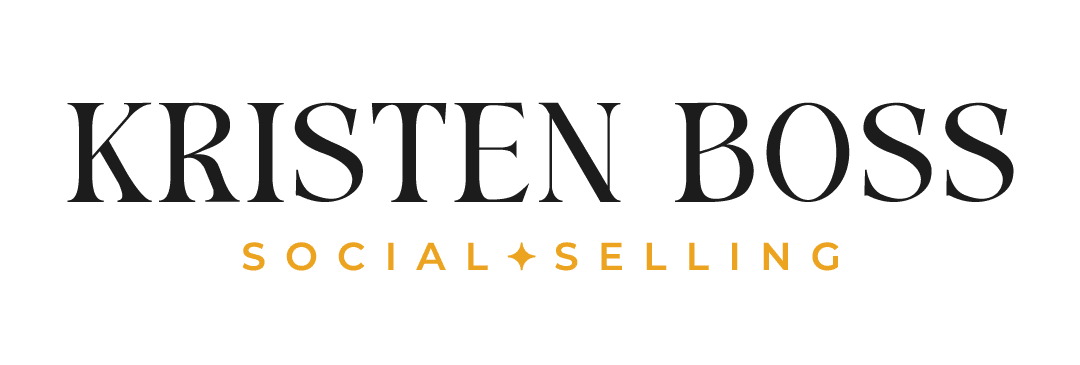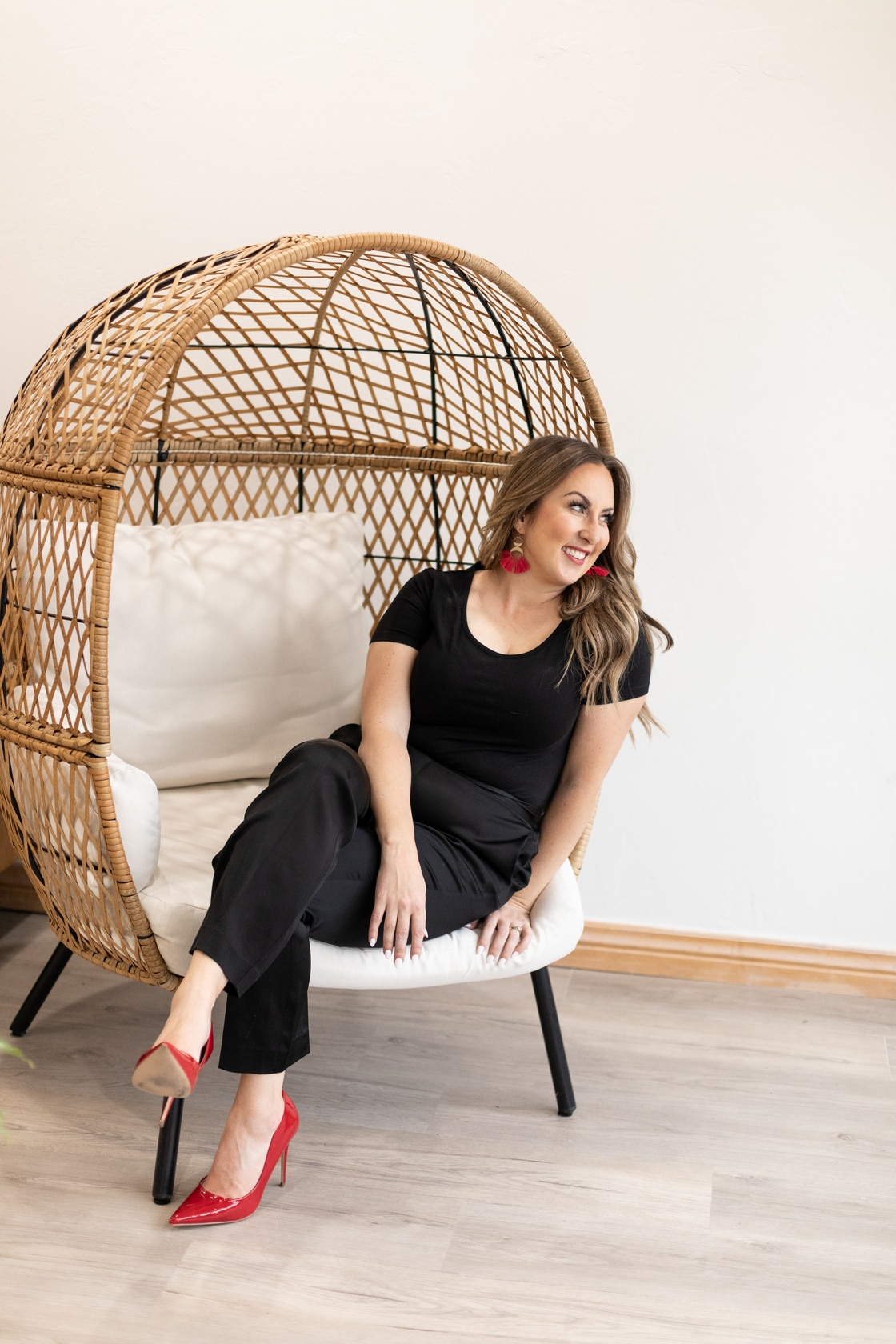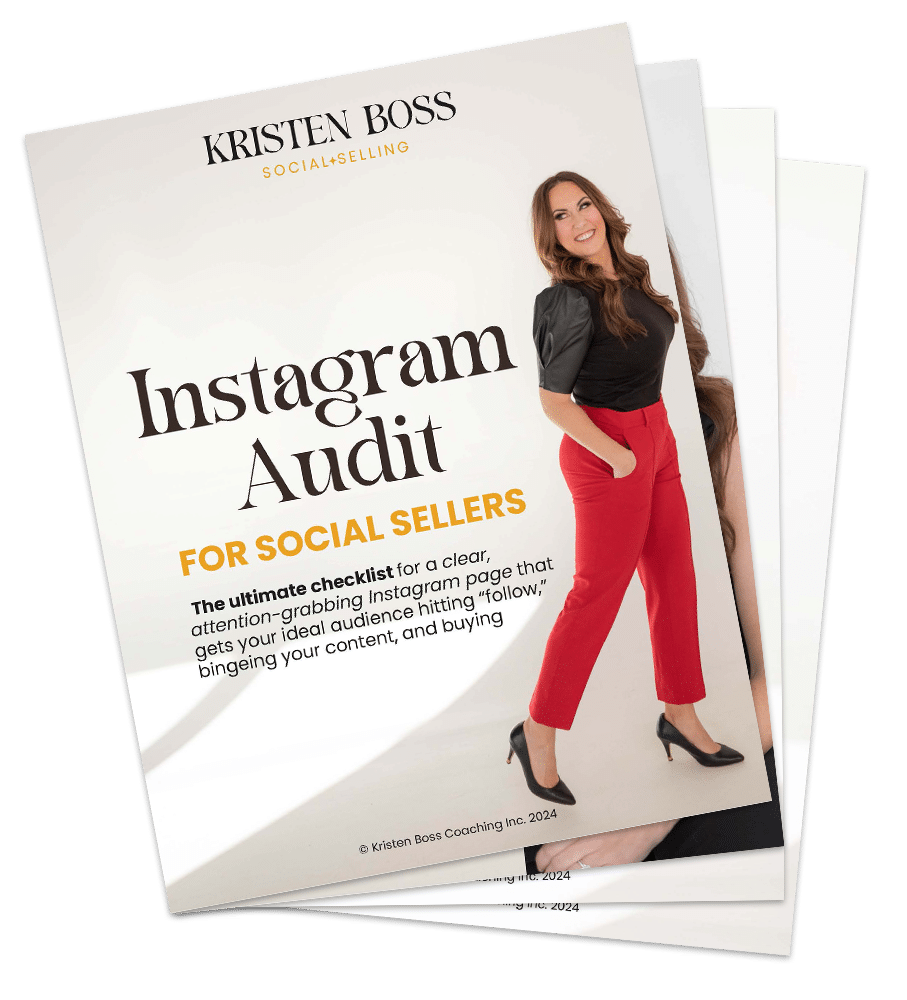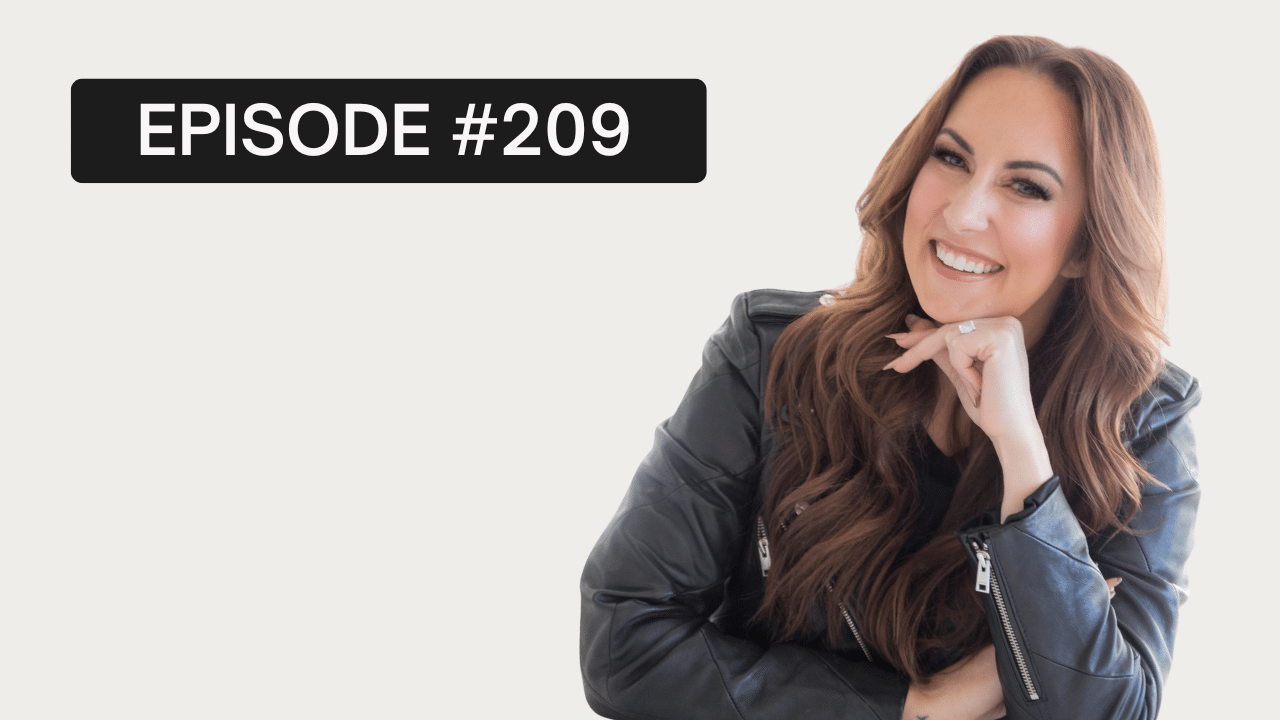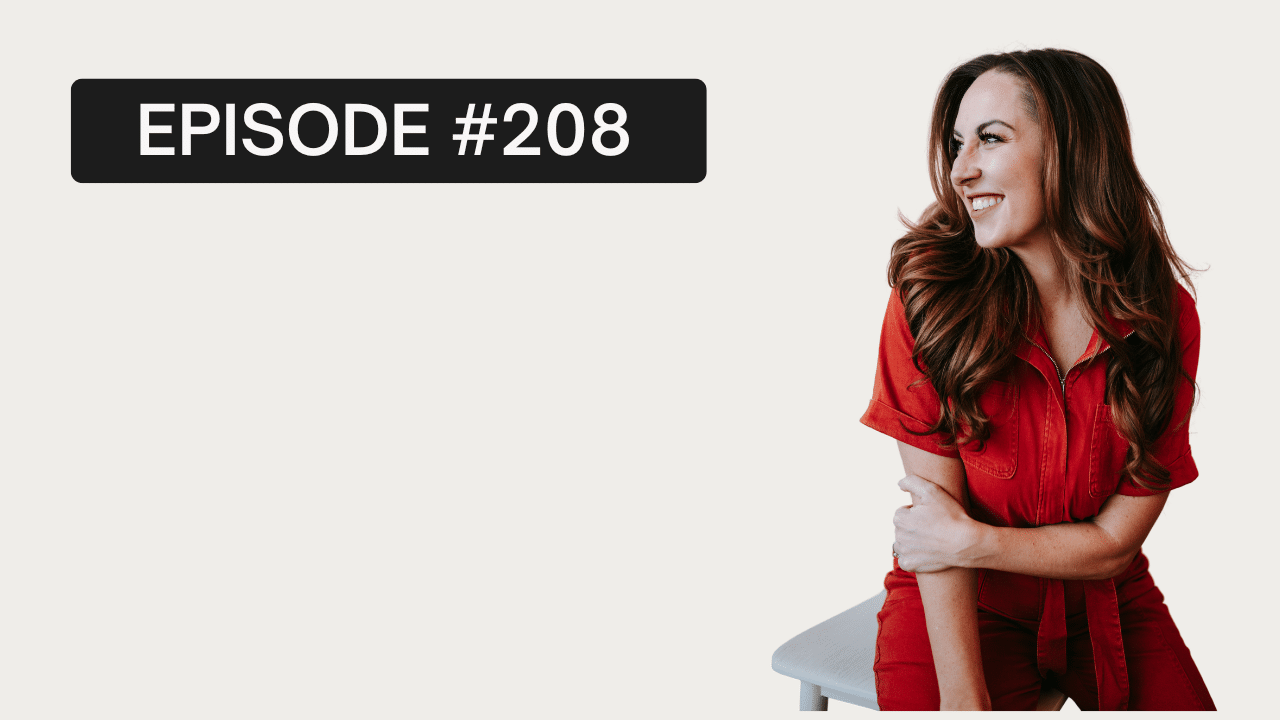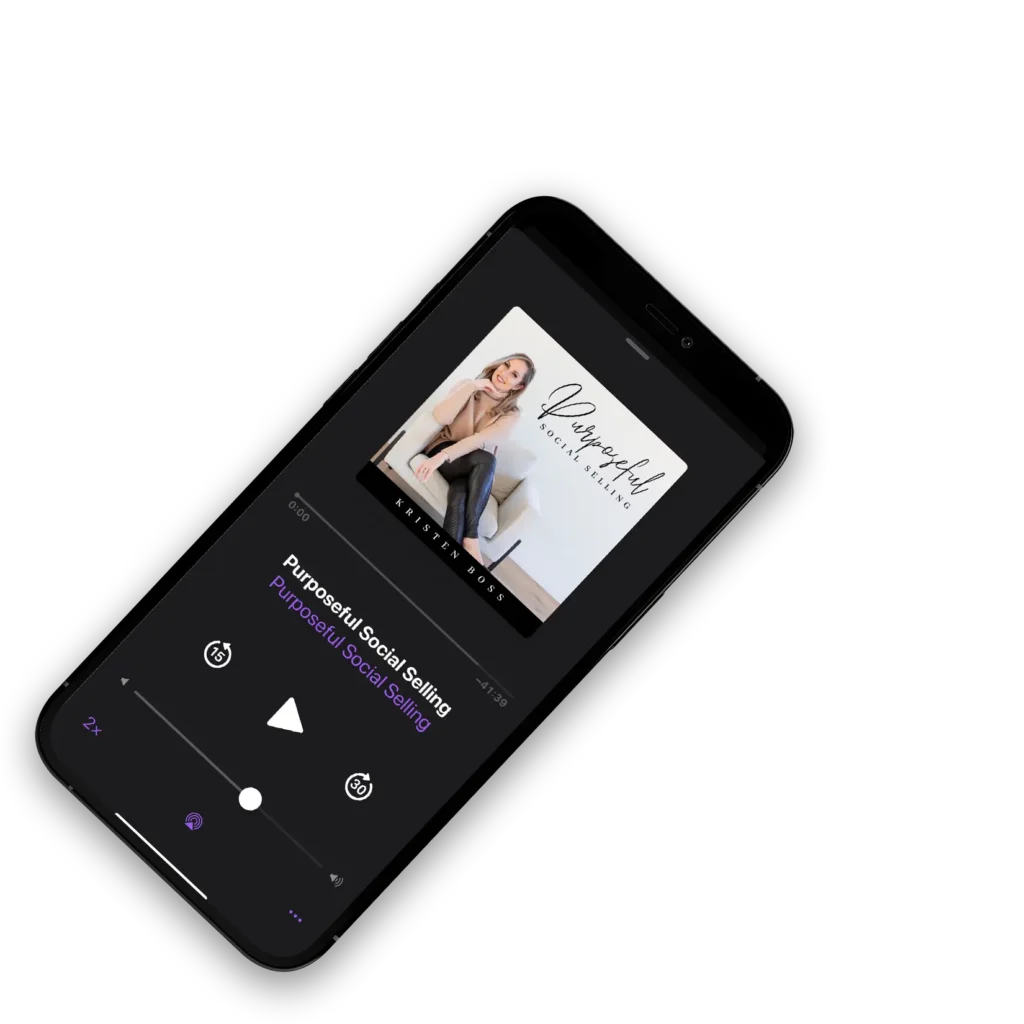Instant gratification is great and all, but what if we told you that it might be the reason you’re not reaching your goals? Choosing the easy path in business (and in your personal life) can set you up for failure. What your brain sees as the easy choice: putting off reaching out to new leads, taking a nap instead of hitting the gym, or simply ignoring your inbox; results in getting nothing done, and you’re just left feeling frustrated and defeated.
Kristen is here this week to shake things up a bit by explaining why what you THINK is easy is actually hard and what you see as hard is actually easy. It’s what she’s termed the easy/hard paradox, and it could be the key to setting you on the path to success.
Listen in as she goes over these key points:
- When choosing what is easy turns into hard
- How deferring the hard compounds and creates even harder stuff later
- What really happens when you do the hard stuff today
- How restraint and delayed gratification can create financial freedom
- The day of reckoning that every entrepreneur faces
Of course, it’s hard to get back in the saddle. But choosing the hard stuff now will create an easier path for you later on. Instead of looking for ways to get away with the bare minimum – reevaluate and try to envision how it will affect you one year, two years – even five years down the road. Then you’ll see that delaying those hard decisions will only make it harder for you to get the results you came for.
Looking for a way to maximize your sales this upcoming holiday season? Then now is the perfect time to download your copy of Kristen’s new Monetize and Maximize Holiday Guide. Inside you’ll find simple and effective strategies designed to turn the last quarter of the year into your best. Click here to buy now.
Thanks for listening! Do you have a question about network marketing? Kristen can help! Drop your question here, and she just might answer it live on the podcast: https://Kristenboss.com/question
Connect with Kristen:
If you’re ready to learn the simple process of running your social selling business online, you have to check out Kristen’s live group coaching program! The Social Selling Academy: www.thesocialsellingacademy.com
Do you have a business full of customers and almost no builders? You’re in need of a reboot! Learn the three skills you can learn that will completely change your recruitment game. Check it out here.
Transcript for Episode #134 The Easy/Hard Paradox:
Kristen Boss (00:05):
Welcome to Purposeful Social Selling with Kristen Boss. I’m your host, Kristen Boss. I’m a mindset and business coach with more than 15 years experience in both the product and service based industries. I believe that social selling is the best business model for people wanting to make an impact while they make serious income. This is the podcast for the social seller who is tired of feeling inauthentic in their business and desires to find a more purposeful and profitable way of growing their business. In today’s social media landscape, in this podcast, you will learn what it takes to grow a sustainable business through impactful and social marketing. It’s time to ditch the hustle and lead from the heart. Let me show you the new way.
Kristen Boss (00:48): Hey bosses. Welcome to another episode of the show. Today what we’re going to talk about is inspired by an interaction or a coaching session I recently had with one of my students that I mentor in my sixth and seven figure earner mentorship, and she’s been with me for a little over a year now. And she started off the coaching session with a great question and I thought, You know what? This would just be a fantastic thing to make a podcast with because it, it’s a conversation worth having that is truly relevant to anybody who’s seeking to make meaningful change in their life. And so how she had asked the question was, she said to me, Kristen, why is it that in my life I keep deferring to the easy thing? Why when I look at the hard thing, I just always go back to what’s familiar and what’s easy.
Kristen Boss (01:40): And this is a story she’s had for a while and she’s like, I don’t know if it’s, I don’t see the value in hard work, or I’m procrastinating, or I’m overwhelmed, or I don’t know why that is. And I said, Stop. We’re going to solve this right now. And I said, The reason why you keep saying that you’re choosing easy is because you actually believe it’s easy. And I want you to actually look for how you picking and choosing the path of least resistant. What feels easy now is actually creating hard for you. And this is what I’m going to call the easy hard paradox where we think choosing easy just keeps creating easy, but when in fact, it’s actually the opposite is true. Choosing easy actually creates hard. And I’m going to break it down a little bit more for you. But maybe you’ve heard the term choose your hard.
Kristen Boss (02:42): You have to pick what your heart is. But here’s the thing, I think if people actually understood the hard on, like actually saw both choices being hard, they would probably make better choices. The choices that they want to be making, I think everybody would be a millionaire. Everybody would have businesses they want. So I actually don’t think people truly grasp what it means to choose your hard. And I want to break it down in a way that is very tangible for you so that you understand it and see it in a new way so that you can see how choosing easy picking the familiar is not actually easy. And what’s funny is when I presented that to her, I was like, The reason why you keep going back there is because you have actually framed this in your mind as something that is easy. You don’t actually realize how this creates hard.
Kristen Boss (03:34): Now the reason why you don’t see the co-relation is because the hard doesn’t happen right away when you are choosing easy in the moment, and I’m going to give you an example of this. Let’s use this through the lens of health. You guys know I see a lot of correlations between health and business. And health is really something I’ve been prioritizing the last 18 months, like intensely in doing a lot of work on that and prioritizing that. So when it comes to the lens of health, when it comes to choosing the easy creating, the hard, I want to give you an example of that. So choosing the easy would be being stagnant, hanging on the couch, being sedentary, choosing the nap, or choosing Netflix or resting or reading a book, choosing something sedentary instead of choosing the hard, which is going to the gym, working out, breaking a sweat, just getting outside, walking, moving in the moment, choosing the gym is the hard, and that is how my client would view the thing in her business.
Kristen Boss (04:40): She was like, Well, that’s the hard, And she was viewing not doing the business tasks as that’s the easy, and through the lens of health, it’s like, well, yeah, it’s easy to sit on my couch, want watch Netflix, read books and not choose to be active. Because the easy choice in that moment is to not go work out. But what we see is that’s all we see in the moment, but we’re not seeing how does me choosing to be sedentary, choosing to not be active? How is that actually creating hard? And the reason why we can’t make that correlation is because it is a deferred hard, meaning the hard that comes from choosing easy is delayed. It doesn’t happen for us right away. So for example, you choosing to not go to the gym, it’s not like all of a sudden your health is suffering, right?
Kristen Boss (05:34): In that moment. No, you get to actually enjoy the dopamine of maybe eating yummy food or watching the show you want to watch or Amazon shopping, whatever it is, like you’re getting your little dopamine fixed there and there’s no hard that is happening in that moment. Maybe you feel a little bit of guilt, but it’s not actually creating a consequence of you choosing the easy in the moment because the heart is delayed, it is deferred, it takes a while, and the heart actually compounds. So this is what I’m going to break it down even further for you. So now let’s take into account you continually choose the easy. You choose not being active, you choose being sedentary. You choose not prioritizing your health. You choose to indulge in anything that your taste buds want. You go for it. You tell yourself no to nothing. And guys, I’m not talking about food freedom.
Kristen Boss (06:30): I’m not talking about that. I’m literally talking about maybe an unhealthy coping relationship with food, and that’s a different topic, different podcast for another time. But in continuing to choose that, what happens is the easy compounds over time. And actually let’s just take that and say, okay, let’s say you keep doing this, and where are we five years from now? What happens when all of the times when you could have chosen what felt hard in the moment going to the gym five years later now because you have chosen the easy, now we have compounded it, and now we’ve created something that is difficult. Now we’ve created, maybe it’s 30 pounds of added weight that you didn’t know where it came from or how it got there. Maybe you threw your back out because you’ve lost all the strength in your core because you’ve lost muscle tone because you’re not engaging and working your muscles.
Kristen Boss (07:21): Maybe you’re developing, your immune system is suffering, maybe you’re developing an autoimmune issue or blood pressure issues, and now you have to go to the doctor. And there’s medication. Like this is why we choose the easy, because oftentimes the hard or the consequences is deferred. So we don’t feel the immediate consequence of that decision. So in that moment, it’s why we think, Oh yeah, it’s easy to be on the couch, but actually it’s just creating hard down the road. So circling back to my client, I said, Okay, you not doing these activities in your business, you think that’s creating ease for you? You think that actually is easy? Maybe it’s familiar because that’s how you’ve been operating for a while, but is it actually easy? I want you to write down and think ahead of what kind of hard kind of consequence this creates down the road if this continues to be unaddressed and you do not do anything about it.
Kristen Boss (08:18): And then we can start actually reframing what you tell yourself is easy. And now you start to realize that’s actually not easy. All I’m doing is delaying and compounding the consequences of me not doing this in the long run, I’m actually going to only make it harder for myself down the road. For example, again, with health and fitness, fitness, it’s just, okay, I could solve this when I only have a few pounds to lose and it’s been a couple months since I took care of myself well and took some vegetable, had some vegetables and took my supplements and whatever else, It’s easier. Sure, it’s not fun in the moment to be like, okay, it’s time to really focus and take care of myself. But it’s easier to solve for losing five pounds than it is four or five years down the road maybe solving for 50 pounds.
Kristen Boss (09:08): Now it becomes a bigger problem that feels heavier. So with this idea of the easy, hard paradox, so now I’ve kind of really painted it for you, you are maybe grasping a little bit of how choosing the easy creates a deferred hard. Now I want to flip it for you, what happens when you choose the hard today and why? Doing the hard today actually creates easy later, but it’s a deferred easy. This, it’s an amazing paradox because you’ll see why we choose easy instead of choosing hard when really hard is easy and easy is hard. If you’re tracking with me. So let’s go with doing the hard things today. Of course, it’s hard to show up for your business in a non-winning season. Of course, it’s hard to spend money to grow your business. Of course, it’s hard to fail and realize I have to develop new skills and we got to try this again, and we need to test it again.
Kristen Boss (10:12): Of course, it’s hard to have to take a real good look at myself and see how I’m creating the results in my business. Of course, it’s hard to take ownership, of course. It’s hard to rebuild. Of course, it’s hard to show up and make a vulnerable post on social media today. That is the hard, But here’s the thing, when we do the hard, now we end up creating easy later. I’m going to give you another great example of a client I was coaching. We were coach. I was coaching her own money and how she was handling her money. And I said, Okay, here’s the thing. If you don’t create a budget for yourself and you don’t tighten this up and you keep letting yourself just compulsively, buy a little here, a little here, and you constantly are kind of going paycheck to paycheck to paycheck, the hard you’re creating later is less money in your retirement.
Kristen Boss (11:04): You feel like you need to work more to keep up with your own consumerism, and you’re only adding more stress because you are not learning to reign in these habits. And even if you were to increase your income, you take these habits with you. And so I said, Okay, so for her exact example when it came to finance and choosing the hard now, choosing the hard now would be restraining your spending, putting yourself on a budget, living beneath your means and taking your excess income and putting it into investments so that they can grow, so that they can compound, so that they can create a return on your investment and your money actually is working for you. So the hard is letting go of the instant gratification, not being able to do compulsive shopping, not being able to shop on Amazon whenever you want. Maybe it’s not buying fresh seasonal decorations at Target every single season.
Kristen Boss (12:01): Maybe the hard is it’s that restraint. It’s the temporary restraint and putting your money to work so that you can actually feel financial freedom later. Notice how restraint and really holding in your impulse control is what actually creates freedom and ease down the road. The heart is constraining your spending in the short term. And what makes it hard for people to choose the heart in the moment is because the reward is delayed. It is deferred. You don’t get an immediate reward. She doesn’t get an immediate a hundred dollars reward every time she chooses to not spend the money. It’s not like, Hey, here you go, and now we’re going to reward you with a thousand dollars. It’s that it doesn’t work that way. It’s actually really getting yourself on board with the concept of delayed gratification. And I was thinking about that experiment. It’s the marshmallow experiment.
Kristen Boss (12:59): If you’ve ever seen with a parent and their child and they put a marshmallow in front of their kid and they tell their kid, Okay, don’t eat that marshmallow until I come back. And I can’t remember if in the experiment they tell the kid that, And if I come back and the marshmallow is still there, I’ll give you another marshmallow. So they know. Okay. And this is the perfect example of instant gratification versus delayed gratification. And oftentimes a child has zero impulse control. They want a marshmallow. They’re going to eat the marshmallow right away because they want the instant gratification of the flavor. They want to enjoy that marshmallow. They’re looking at it, they’re smelling it. They’re just like, Ah. And it’s so cute, those videos, you just see the kid fixate on the marshmallow and I love watching it. And some kids, they just cannot handle it.
Kristen Boss (13:50): And they just shove the marshmallow down and they’re just like, Man, that was so delicious. But then it’s gone. Mom comes back and they’re like, Oh, you didn’t wait. But then the one that waits and waits and waits and exercises their patients and they delay their instant gratification, what ends up happening is the parent comes back in and then they get a second marshmallow because they waited. This is so much about how playing the long game works in entrepreneurship. If you’re willing to let practice the restraint, especially with money of letting the marshmallow sit on the table when everything in you wants to spend it, wants to buy the next fancy thing and letting it be there, and actually with time, it gets to compound with interest. So the perfect example of when you do hard, now you create easy later. It’s the same with your budgeting, with your spending, even with, think about again, we’ll tie it back to your health.
Kristen Boss (14:44): If you are engaging in hard by going to the gym, prioritizing your health, working on your strength, working on movement and supplementation and water, well, what’s the easy later? The easy later is I might not have to go to a retirement home and someone else isn’t going to have to wipe my butt, heaven forbid, unless there’s like a crazy condition I get. But I’m going to be able to chase my grandkids. I’m going to be able to have a full rich life. I’m going to be able to be on the golf course at 85 years old having the time of my life because I did the hard early and I developed the skills where it created easy later. So this idea of my client saying, Why do I keep choosing the easy is because she didn’t really understand how her easy actually is hard. And I said, I really want you to sit down and write down why your easy is actually making it harder for you.
Kristen Boss (15:39): And why doing something hard in the short term is actually worth the rewards in the long term. And oftentimes, we’re not looking at that closely enough. We’re just looking at how we feel right now in the moment and what we want right now. And I have talked to so many, I’m talking very, very, very successful business owners, 7, 8, 9 figure businesses. And I listen to some of the best out there. And they all say hands down, that part of playing the game is practicing restraint, impulse control, and the ability to delay your gratification for long periods of time. And I was just thinking about this even in my own company, doing some things and making some moves because I’m working on, I have a five year vision of where I want to go. And I know that the small things I’m doing today are getting me closer, but I’m not seeing any type of instant reward.
Kristen Boss (16:38): I’m working for something that I’m not going to experience the reward of for another five years, but I’m enjoying the process. I’m enjoying the journey, and I’m okay with that. And I’m willing to keep engaging because I know where I’m going. And a lot of times when people are looking at their business, they’re too shortsighted. They’re like, Well, it needs to be here it to all. I need all my results this year. I need all my results this month. I need it all right now. And I think most of the time why people aren’t consistent is because they aren’t willing to be patient for their result. And it not just patient, I think they try something once and then they throw it out and they say, Well, it didn’t work. And they maybe try it the same exact way and they get the same result and they’re like, Ah, still doesn’t work.
Kristen Boss (17:28): The definition of insanity is doing the same thing over and over again while expecting a different result. And this is what I see people doing in business. Instead of thinking about, Okay, I tried this one thing, Let me get the data of what that one thing produced, what worked, what didn’t work, what would I do different? How do I need to maybe tweak it, refine it. And then you put out, if they’re putting out test A, you have to look at the data and be like, What is everything I learned from test A? Then I’m going to take that data and I’m going to take the changes I need to make, and then I’m going to put out test B based on the data from test A, and then I’m going to put out test B. I’m going to do the same thing. I’m going to put it out there, see what worked, what didn’t work, what I need to refine, and then eventually, however many tests it takes to get to the desired result.
Kristen Boss (18:18): But most people decide, Test two, test three, test four, test five. It ain’t worth it. I guess it wasn’t meant to be, because again, they expect this instant gratification of like, Oh, I should have all of my results by now, but it’s probably just taking you longer than you thought it would. And oftentimes, especially in entrepreneurship, I can’t think of anything that levels the playing field more than entrepreneurship. You can have people coming from all walks of life, and entrepreneurship is literally the wild west. Everybody starts from zero and they have to grow new skills. Every single person. Some people might take preexisting skills from other fields of work that they were in, but there comes a point in time, there is a reckoning. There is a day of reckoning for every entrepreneur where that person is made or they quit. It’s their moment in the making or whatever they’re making in the moment.
Kristen Boss (19:11): They have their day of reckoning where it’s just they decide in that moment is going to make me or break me. That’s what I was going for. So this idea of if you keep choosing the easy, you are only creating the hard later. And I want you to look for areas in your life and in your business, where are you choosing easy? Where are you choosing the path of least resistance? Because the path of least resistance also has the least and the lowest yield of reward fruit, however you want to put it, like the path of the most fruit, the most reward, the most impact is the path of the most resistance. And everybody is always looking for what is the path of least resistance? What is the path that requires the least of me, the least effort, the least frustration, the least amount of suffering? And if you’re always looking at what is the bare minimum that is required of me, don’t be surprised when you get bare minimum results instead of asking yourself, How am I willing to go all in on me, all in on what I want?
Kristen Boss (20:23): And I’m willing to do whatever it takes to get there in a healthy and sustainable way. This is what I do. I’m just committed. I don’t care how many things I have to try to figure it out, That’s what I’m going to do. And I got knocked on my butt plenty of times. I was told no, I don’t even know, hundreds, thousands of times. But I knew where I wanted to be and where I wanted to go, and I was willing to choose the hard over and over again for the future, for the easy I wanted to create down the road. So this concept of choosing your hard, yeah, it’s you either choose hard now or hard later. And I hope you choose hard now because the rewards you get later, they’re worth it. We’ll catch you in the next episode
Kristen Boss (21:14): That wraps up today’s episode. Hey, if you love today’s show, I would love for you to take a minute and give a rating with a review. If you desire to elevate the social selling industry, that means we need more people listening to this message so that they can know it can be done a different way. And if you are ready to join me, it’s time for you to step into the Social selling Academy where I give you all the tools, training and supports to help you realize your goals. In the Academy, you get weekly live coaching so that you are never lost or stuck in confusion. Whether you are new in the business or have been in the industry for a while, this is the premier coaching program for the modern network marketer. Go to www.thesocialsellingacademy.com to learn more.
